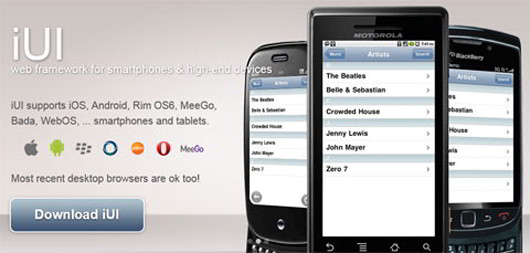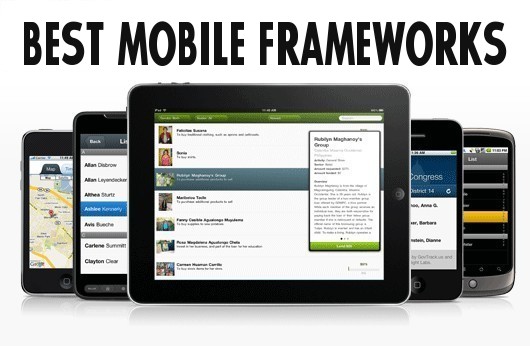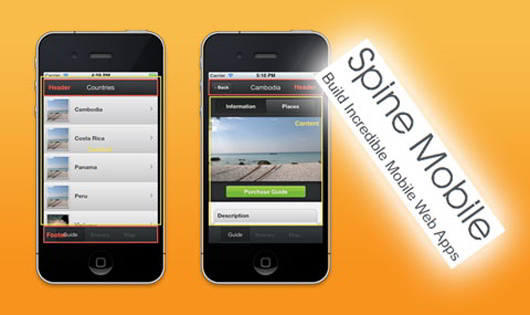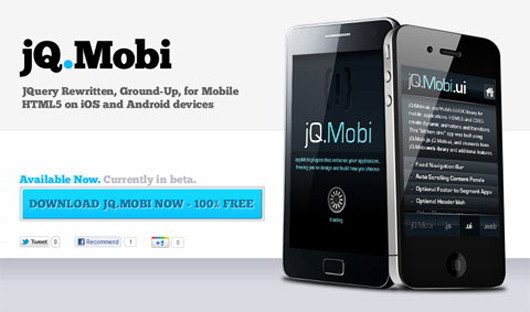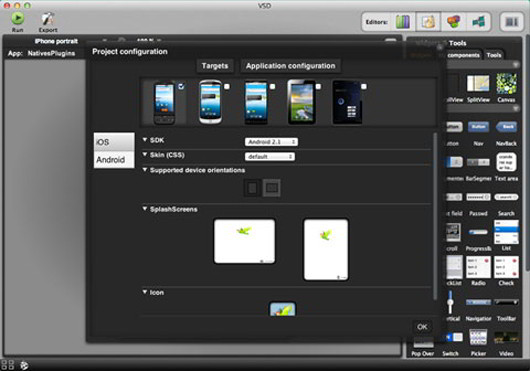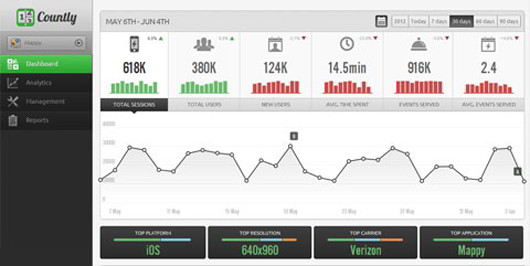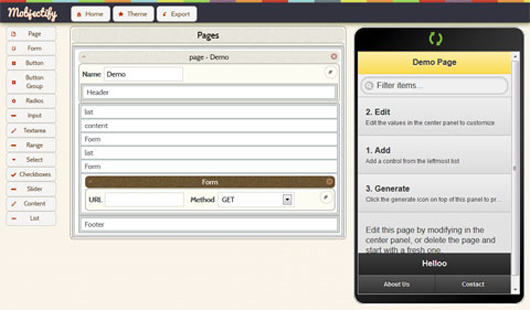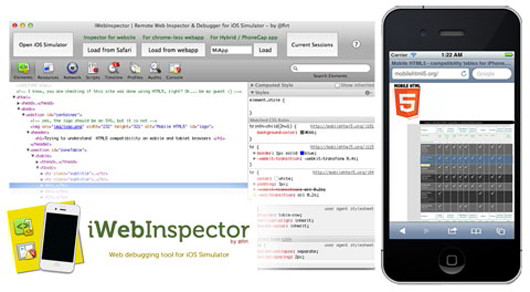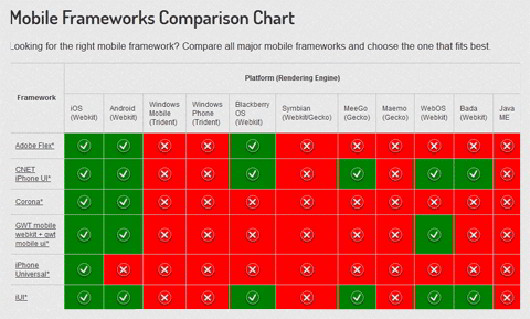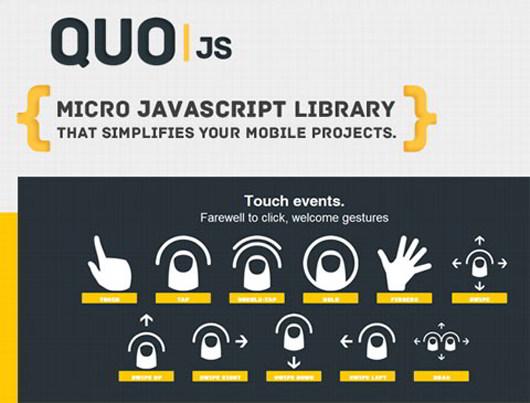Regardless of how one tries to measure it, mobile computing is growing astronomically. Daily usage of smartphone penetration, cellular subscriptions, search traffic, ad impressions, app sales: everything is up. Thus it seems inevitable that mobile devices are rapidly overtaking traditional desktop and laptop computers as a primary computing platform.
The massive growth of mobile computation presents software developers with some pretty amazing opportunities, but also significant challenges. The massive explosion of mobile platforms and devices has created an unprecedented level of fragmentation, and it’s going to get worse before it gets better. Development, testing and distribution of an app for multiple platform/device combinations can be prohibitively expensive.
jQuery is a hugely popular (and deservedly so ) JavaScript library which presents a unified API for common JavaScript web dev tasks such as DOM traversal and manipulation, Ajax, and event binding. It uses a selector syntax based directly on CSS, so web designers typically find it very easy within using jQuery.
jQuery has been rigorously tested across all A, B, and C grade browsers (desktop and mobile), has a vibrant developer community and excellent docs, and is completely a free open source software. The only potential downside of using jQuery for mobile development is that it’s significantly bigger than it needs to be because it contains a fair amount of code targeted at fixing weaker desktop browsers.
jQuery Mobile is like jQuery UI for mobile. It’s a widget library which converts semantic markup into a familiar, finger friendly format. It is built on top of jQuery and has one of the best-in-class support across A, B, and C grade mobile browsers. It’s a fairly young but very ambitious project which aims to create the best possible mobile web experience on the largest number of browsers out there. The total file size is a bit on the large size but it’s a great choice if you’re creating a mobile version of a public website.
In this edition we would like to present our readers with 15 of the Best JS Mobile Frameworks for building your apps, keeping in mind that one should use as much HTML as they can without negatively impacting the user experience because the more HTML one incorporates, the less they have to worry about fragmentation. And the less you have to worry about fragmentation, the more awesome stuff you can build. So, what are you waiting for? Go build some Awesome stuff now
1. Enyo : A JavaScript Framework for Desktop Mobile
Enyo, the JavaScript framework which was created to power the apps on HP’s TouchPad, has recently reached v2 and now offers cross-platformcompatibility rather than only webOS (as v1 did). The new Enyo supports both desktop + mobile, works in all major browsers and comes with a broad set of cross-platform UI widgets + a powerful layout library for building apps. UI widgets include toolbars, buttons, form elements, sliders, menus, pickers, tooltips and more.
Check Here
2. Mobello : JavaScript UI Framework for Mobile Apps
Mobello is an open source JavaScript UI framework that simplifies developing mobile web apps. The framework aims to provide a native-like experience in mobile, it is optimized for touch events and has 20+ widely-used UI components. It also has an IDE, named Mobello Studio, that focuses on building mobile apps with HTML5, CS3 and the Mobello framework. Mobello Studio has a drag ‘n’ drop enabled visual design editor, a JavaScript debugger and built-in mobile device emulator.
Check Here
3. Spine Mobile : A JavaScript Framework for Mobile Web Apps
Spine Mobile is a JavaScript framework, built on top of SpineJS, for building mobile web apps that look and feel native. The framework comes with specialized controllers, panel layout, hardware accelerated transitions and touch events. Apps are developed with HTML5-CSS3 and the easiest way of building Spine Mobile apps is with Hem, Spine.app, GFX and jQuery. Also, you’ll need Node.js.
Check Here
4. Sidetap : Simple Framework for Mobile Web Apps
Sidetap is a simple and lightweight (2kb minified, gzipped) framework for creating mobile web apps. The framework actually focuses on providing a flexible side-navigation similar to the one we know from Facebook’s mobile app, and, once the navigation part is solved, it is pretty easy to build a simple mobile web app. It works by telling Sidetap “the content element to be animated”. It takes care of clearing the stage using whatever animation is appropriate for the situation.
Check Here
5. Moobile : Mobile App Framework for MooTools
Moobile is an exciting and fresh project; a mobile web application framework built on MooTools. Currently, it is focused on providing a iOS-like experience on WebKit browsers and comes with many controls like bar, button, image, list, activity indicator, slider and more. It also has support for transitions like fade, slide, cubic or cover and can display native-like alerts. Interfaces created with Moobile are fluid, they will work well both in iPhone + iPad and look good when orientation changes.
Check Here
6. jQ.Mobi : jQuery-Like JavaScript Framework for Mobile
It is a fresh and open source JavaScript framework -developed by appMobi- that focuses on providing a great experience on both of the dominant mobile operating systems with a tiny footprint and code efficiency. Compared to jQuery Mobile (24kb), it is much smaller in size with only 3.5kb (both minified and gzipped) and covers most features with the same syntax. When it comes to speed, jQ.Mobi is impressive there as well and mentioned to be 3x faster on Android and 2.2x faster on iOS.
7. iUI : User Interface Framework for Smartphone & Tablets
iUI is a mobile web framework that has been around for a long time (since 2007) compared to many other mobile resources. The framework includes a JavaScript library, CSS and images for developing touch-enabled web apps. User interfaces to be created are iPhone-like yet compatible with most smartphones and tablets and has support for menus, forms, lists, image galleries and more.
Check Here
8. ViniSketch Designer : A Free App for Creating Mobile Apps
ViniSketch Designer is a free application -for Mac OSX- for designing and creating mobile applications using native and web technologies. It comes with feature-rich visual editors for designing the GUI + dataflow and code editors for keeping the development under control. The engine of the app has support for multiple platforms and you can managing your mobile app for each device you’re targeting. ViniSketch Designer is currently compatible for building iOS + Android apps, however, compatibility for other popular platforms are under development.
9. Countly : Open Source Mobile Analytics App
When it comes to tracking websites, there are open source analytics apps like Piwik, OWA or ChiliStats. But, for mobile, it is hard to find a good one. Countly is a modern, real-time and open source mobile analytics application which can collect data from mobile phones and visualize that info for analyzing mobile app usage + end-user behavior. With an event-driven system, almost every action can be tracked including in-app purchases, when a user closes the app, ad-click behavior, etc. All these details are displayed in the slick interface of Countly. And, you are not limited to racking a single app. The same interface enables adding any number of apps.
Check Here
10. Mobjectify : Quickly Build Mobile Web Mockups
Mobjectify is a free web application which makes it so much simpler by offering an awesome web-based mockup builder. The application enables us to create pages and add various web elements(like forms, buttons, content areas, footers, etc.) with few clicks. It also offers multiple themes to choose from or you can create new themes. There is a live preview and results can be exported as a single HTML file anytime.
11. Swipe JS : Standalone Content Slider for Mobile
Swipe JS is a lightweight (3.7kb minified) mobile slider with 1:1 touch movement (sliding content based on exact touch position). it has API methods for custom interactions including the display of prev-next items and getting the current position. It can display any HTML content and offers a native-like experience with features like: resistant bounds (increased resistance to slide when there are no items to display next or before), smart resizing on rotation as the slider resets to make sure the sliding elements are sized right and many more.
Check Here
12. iWebInspector : Web Debugging Tool for iOS Simulator
iWebInspector is a free tool for debugging, profiling and inspecting web applications that run on iOS Simulator (iPhone or iPad). The tool simply attaches the Web Inspector to any tab opened in Safari for iOS, to a chrome-less web app (full screen) or to a PhoneGap application. It allows :
• see and browse every element on your HTML element. You can change attributes, content and styles and see how they apply on Safari
• see all the resources involved in this page, including Databases, Local Storage, Cookies and ApplicationCache
• check all the network traffic on your website
• see all your scripts, create breakpoints, watches and debug your JavaScript code.
• record a timeline showing you rendering, scripting and loading times while you browse on Safari
• profile your JavaScript code
• audit your code, showing you a report on performance and other stuff
• see and use the JavaScript console
13. A Detailed Comparison of Mobile Frameworks
A frequently-updated chart by Markus Falk does this for the mobile frameworks as there is a detailed comparison of their capabilities. The chart displays the rendering engines supported, target platform, hardware, development languages, UI features and license for each framework.
14. QUOjs : Tiny JS Library for Mobile Projects
QUOjs is a JavaScript library that is focused on mobile web projects, has asmall footprint (13kb minified) and includes all the essentials. There are functions for HTML document traversing, event handling, Ajax interactions and mobile environment detection. It has support for all the major touch events, the API is jQuery-like and works cross-browser.
15. jqmPhp : HTML Code Generator for jQuery
jqmPhp is an open source project that aims to simplify using jQuery Mobile with PHP. It is a pack of PHP classes that can generate the HTML outputs which jQuery Mobile is expecting within few lines. The classes are on separate files (with names parallel to the JQM’s features) so you can choose to only use the necessary ones.
Check Here

